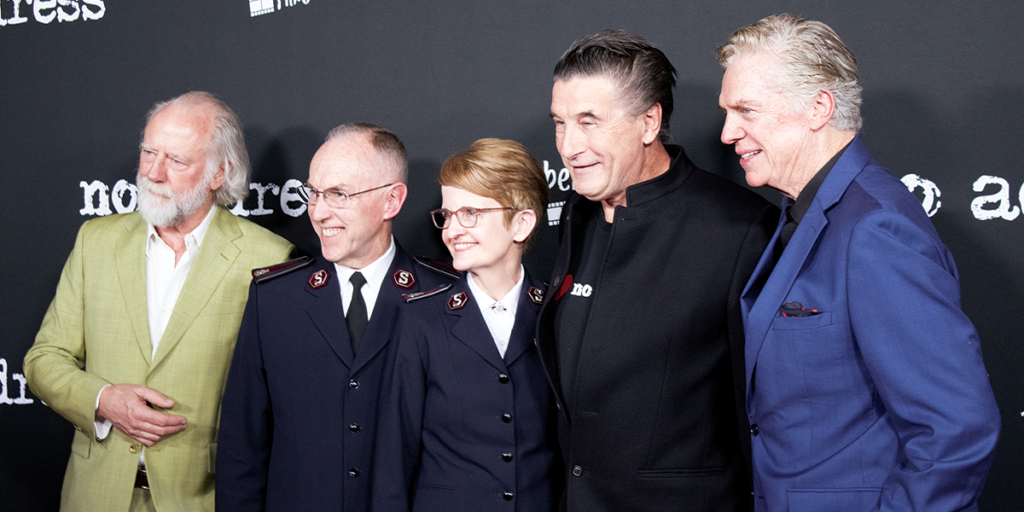“No Address” Premiere: A Red Carpet Call to End Homelessness in America
A star-studded cast and a powerful Salvation Army partnership highlight homelessness.
LOS ANGELES — This February, Robert Craig Films released its first feature film, “No Address.” The film, inspired by true events, tells the story of a group of individuals experiencing homelessness. It is a cinematic exploration of hope, humanity, and resilience as the characters navigate life with no physical address, showcasing the reality that homelessness could happen to anyone. Starring William Baldwin, Xander Berkeley, Ashanti and more, the movie highlights the interconnected lives of characters uniquely affected by the homelessness crisis in America.
During the movie’s production, Robert Craig Films partnered with several nonprofits, including The Salvation Army, to end homelessness. The film’s final moments prominently feature Salvation Army activity. To mark this partnership, then-national leaders Commissioners Kenneth and Jolene Hodder were invited to the premiere at the Directors’ Guild of America in Los Angeles, where they walked the red carpet and mingled with celebrities like Christopher McDonald and Montell Jordan. Several Salvation Army officers and soldiers from the Southern California division attended the event, including divisional leaders Lt. Colonels Mike and Cindy Dickinson.

“I’m incredibly proud to be part of the ‘No Address’ movement, which calls everyone to action to tackle the misunderstandings surrounding those experiencing homelessness and enable radical change on our streets,” said Commissioner Jolene Hodder. “After visiting the movie set, meeting the stars — who each had personal reasons for dedicating their time and talents to this movement — and discovering that the movie also showcases The Salvation Army’s ministry, I knew I had to get more involved and connect the national Salvation Army with this great cause.”
Commissioner Hodder also noted that the “No Address” initiative isn’t just an amazing film, soundtrack, and novel. It includes a documentary entitled “Americans with No Address,” produced concurrently with the feature film. In this documentary, both Commissioner Jolene and her husband were interviewed, giving them the opportunity to share the Army’s heart on this issue of homelessness and connect with other organizations with similar missions. Additionally, there is a Bible study guide available on Amazon, “No Address: An Interactive Study Guide,” for which Commissioner Jolene Hodder wrote a chapter. Half the profits from all “No Address” media benefit over 1,000 organizations supporting homeless people, including The Salvation Army.

Stars of the movie also shared their experiences with the “No Address” project, and why it has been significant to them. William Baldwin was particularly moved by producer Robert Craig’s passion for the project. “Robert Craig put his money where his mouth is to step up and say, ‘If I’m going to get into the movie game, I want to make films that matter, and I want to make films with social messaging,’” Baldwin said. He’s talking about [producing] films about human trafficking, the fentanyl crisis, homelessness, and mental health issues. And here we are thanks to his generosity.”
Singer-songwriter Ashanti, who wrote and performed an original song for “No Address” and stars in the film, looks forward to using the movie to spread awareness of the causes of homelessness and to dispel stereotypes about the unhoused. “When you see someone, you don’t necessarily have to clutch your purse or roll up your window,” she said. “This will open hearts, minds, and eyes to the fact that these are human beings. These are people.”
Ashanti emphasized how homelessness can happen quickly. “It genuinely can happen in the blink of an eye. You can be doing everything right — you can be going to work, picking up your child, doing everything right in life — and miss one payment, fall behind on rent, and find yourself living in your car.” She referenced the devastating LA fires earlier this year, which displaced many people who were thought to be “safe” from homelessness but ended up in shelters with nowhere to go. “It could just happen.”

Xander Berkeley, whose character in “No Address” serves as a mentor and protector to others, said, “As an actor, there’s this empathy that wants to put itself in the shoes of others in such a way that it’s convincing and can share the lives of others with people. The opportunity to share the life of a vet who ended up on the streets was an incredible honor.” He continued, “It meant a lot to me to tell a story that I’ve cared about for a very long time and have tried, on an individual level, to address. It felt wonderful to have the opportunity to work and tell the story on a larger scale for more people to see.”
Ty Pennington, who plays a small but impactful role, emphasized the power of human connection in helping the unhoused. In a pivotal moment, Pennington offers one of the main characters a job, though they’ve failed to follow through before. “Anybody suffering through [homelessness] just needs to be seen, they need to feel like someone believes in them,” Pennington said. “Sometimes it’s just one person’s decision to take a chance on somebody that could turn their life around.”

Following the film’s screening, the cast and director Julia Verdin participated in a Q&A moderated by Commissioner Kenneth Hodder. Commissioner Hodder got the stars to open up, asking questions that revealed how their eyes had been opened to the homelessness crisis and how working on “No Address” had changed them. During the session, Baldwin paused to congratulate Commissioners Hodder for their decades of service in The Salvation Army, which has included untold hours of work with the unhoused.
As Ty Pennington noted during the Q&A, most people are unaware of the full extent of The Salvation Army’s work beyond the thrift stores. By showcasing Salvation Army officers and soldiers operating shelters, providing food, and offering compassion to those in need, “No Address” provides a powerful opportunity to raise awareness about the Army’s ministry and inspire people to get involved. To learn more about “No Address” and how you can support the effort to end homelessness, visit noaddressmovie.com.







